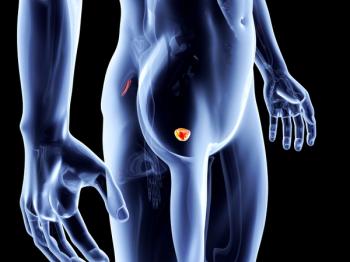
Higher Gleason Score and ADT Efficacy: Examining the Link in Prostate Cancer
Researchers examined whether a higher Gleason score impacts the efficacy of androgen deprivation therapy.
Men with Gleason score 9–10 prostate cancer may derive a smaller survival benefit from androgen deprivation therapy (ADT) compared with those with Gleason score 8 disease. However, in individuals with Gleason score 8 prostate cancer, ADT is associated with an approximately 20% decrease in all-cause mortality. These are among the findings of a new analysis
David Yang, MD, of Harvard Medical School and the Harvard Radiation Oncology Program in Boston, and colleagues conducted a retrospective study of more than 20,000 men from the National Cancer Database (NCDB). All individuals had localized or locally advanced, Gleason score 8–10 prostate cancer who received external beam radiation therapy (EBRT) between 2004 and 2012. In this cohort, 78% of men with Gleason score 8 disease (9,509 of 2,160) and 87% of men with Gleason score 9–10 disease (6,908 of 7,979) received ADT. The researchers aimed to examine the ADT and overall survival for those with a Gleason score of 8 (Grade Group 4) vs those with a Gleason score of 9–10 (Grade Group 5).
After conducing a multivariable analysis, Yang et al found that ADT was associated with a significant improvement in overall survival for patients with a Gleason score of 8 (adjusted hazard ratio [HR], 0.78), but not for those with a Gleason score of 9–10 (adjusted HR, 0.96). In addition, a higher Gleason score (8, 9, or 10) was associated with a decreasing benefit from ADT. However, the authors cautioned that the study is limited by the relatively short follow-up of a median of 4.0 years.
Based on the results of the study, intensification of therapy should be considered for prostate cancer patients with a Gleason score of 9–10, the authors concluded. They also encourage enrollment of such patients in clinical trials or potentially adding novel anti-androgens or docetaxel. Both of these therapies have been shown to be effective in castration-resistant and castration-sensitive settings, according to the authors.
Desai also cautioned about the caveats of a population database analysis like this one. “At best, this study should provoke post-hoc analysis of completed trials of high-grade prostate cancer undergoing ADT plus radiation therapy to ascertain whether this lack of benefit for Gleason 9–10 can be validated, or whether it is just a statistical anomaly of NCDB due to unaccounted for confounders, as has been seen in more cases than not with NCDB analyses,” Desai told Cancer Network.
Newsletter
Stay up to date on recent advances in the multidisciplinary approach to cancer.















































